Buy Wine by the Case
95 products

- White Wine
- Chenin Blanc
- Sustainable
- Dry
- Medium Bodied
- 750ml
- 12.97% alc./vol
About the Winery
Pearce Family Wines

In the early 2000's Nicholas Pearce was exposed to the garagiste movement in Bordeaux and was particularly inspired by négociants like Jean Luc Thunevin (Saint Emilion), James Sichel (Margaux) and Nicolas Potel (Beaune) from Burgundy.
After returning home to Ontario and starting his own wine company, he has had a hand in making 10+ wines in two hemispheres, 3 countries and 5 different appellations since the 2013 vintage.
Pearce Predhomme

Pearce Predhomme is a collaboration of like-minded individuals from around the globe. Founded with a mission to build and import wines from our favourite appellations while offering an unequaled value/quality ratio for the sommeliers & wine buyers in Ontario. This is a project between Toronto Sommelier and entrepreneur Will Predhomme and Ontario wine importer Nicholas Pearce. They have partnered with Radford Dale in South Africa and NorthWest Wine Co. in Oregon to create these special cuvées.
Press Reviews
Platter Wine Guide 2026
4.5 Stars (91/100)
Remarkably generous & forthcoming at modest 12.5% alcohol, 2024 layered stonefruit & sweet citrus swathed in rich, creamy lees. Hints vanilla & nutmeg, nicely integrated, attest to 9 months in seasoned barrels.
WineAlign
90 points (2022) - Michael Godel
Good Stellenbsoch season, of that there can be no doubt and surely less complaints, especially as it goes for chenin blanc. By count this is the eighth take on the variety by winemaker Jacques de Klerk for the négoce duo of Nicholas Pearce and Will Predhomme, always wild, always alive and never boring. This hums that familiar tune and reminds us all how chenin and Stellenbosch are so intrinsically connected so that a winemaker need only pay attention to timing and details for the wine to make itself. Feels so natural, in synch and on time. Drink 2024-2027. Tasted April 2024.
- Red Wine
- Grenache, Mourvèdre / Monastrell, Samso / Carignan, Syrah
- Sustainable, Vegan-Friendly
- Dry
- Medium Bodied
- 750ml
- 14.5% alc./vol
About the Winery
Domaine Andre Aubert
At the very heart of the Rhône Valley, at the northerly tip of the Southern Rhône, lie the vineyards of Grignan-Les-Adhémar. The chances are you haven’t heard the name before, few people have, but the wines are worth seeking out. It’s not a new wine region – vines have been planted here since around 500BC but it is a new name (formerly known as Côteaux-du-Tricastin). Domaine André Aubert, has been formed over decades and today comprises of more than 280 hectares spread from north to south of the prestigious Southern Rhone Valley on the appellations Côtes du Rhône, Côtes du Rhône villages, Visan, and Grignan-les-Adhémar.
Press Reviews
Wine Align
90 points - David Lawrason
This is new appellation (formerly Coteaux de Triscatin) is the northernmost in the southern Rhone. It uses the typical southern Rhone varieties, but none can be more than 80% of the blend. This is a quite elegant, well structured, mid-weight red with some stony minerality, lifted pepper and savoury notes. Not as opulently fruity and rich as many peers, yet very tidy and balanced. The length is very good to excellent. Tasted March 2022
- Rosé Wine
- Cinsault, Grenache, Syrah
- Organic, Vegan-Friendly
- Dry
- Medium Bodied
- 750ml
- 13.5% alc./vol
About the Winery
Mas Carlot

Mas Carlot is situated in the south of the Rhône Valley, extending across 76 hectares of pebbly land southeast of Nîmes. Originally a 17th century farm, this beautiful estate was resurrected in the 1960's by the Blanc family—it is currently run Cyril Mares of the neighbouring and equally reputable property, Mas Bressades.
The appellation of Costières de Nîmes used to be considered part of eastern Languedoc but the climate, soil, topography and wine are far closer to those just over the river in the Southern Côtes du Rhône. It is now a region very much on the up and is widely recognized as a great source of excellent value wine.
- Red Wine
- Nerello Cappuccio, Nerello Mascalese
- Sustainable, Volcanic
- Dry
- Medium Bodied
- 750ml
- 14.5% alc./vol
About the Winery
Azienda Agricola Tornatore
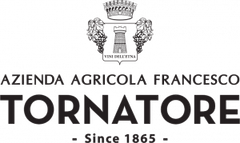
Out of a Sicilian family heritage that traces back to the 17th century, the Tornatore’s Mount Etna wine ventures began in 1865. Today the family’s operations are headed by Giuseppe Tornatore, a businessman whose expertise led to the acquisition of some of the region’s finest north-facing vineyards in the early 2000’s. That heritage and the Tornatore’s profound respect and understanding of the land is showcased in wines that capture the essence of Etna, deftly balancing concentrated flavors, complexity, freshness and refinement.
The company lies in the northern side of Mount Etna, the highest active volcano in Europe. The soils have volcanic origin and were created through the disintegration of lava, ash and stones from previous volcanic eruptions. The climate on the northern side of the Etna is characterized by mild temperatures, and more rain fall reflecting the influence of the Volcano. The combination of soil, climate and the skill of the winemakers, have made the northern slope of Etna an ideal area for the production of high-quality wines. “Our vineyards and our winery are only a few kilometers from our family home. Our entire family is rooted there. We have the greatest respect for this region, and we believe we have a responsibility to be stewards of Etna and to reflect its distinct character in our wines.” - Giuseppe Tornatore
Press Reviews
Wine Align
91 Points - John Szabo, MS
2022 yielded a very pretty, fresh and lively Etna Rosso from Tornatore, with classic nerello mascalese flavours of smoky strawberry and raspberry, savoury herbs and very subtle, quality wood influence. Tannins are grainy in the Etna style and acids are properly firm-fresh, while density and intensity are impressive, especially considering the price. A first class value I have to say, a perfect entry point to exploring the wines of the volcano at a very attractive price - at twice the price I would think it's fair. Drink or hold 2-4 years; a terrific vintage. Tasted November 2025.
91 points - Michael Godel
Straight shooter this Etna Rosso, accessible and amenable to all, now and for all the right reasons. Fruit first, ripe and delicious, aromatically charged and energizing the entirety of the wine. Rosso for Rosso’s sake, crunchy and palatable with great toothsome character, A guarantee and stamp of quality in the most professional of Etna Rosso ways. Unwavering consistency from Tornatore. Drink 2025-2028. Tasted May 2025.
91 points - David Lawrason
This is a typically pale nerello mascalese from the north slope of volcanic Mt. Etna. The nose nicely combines sour cherry fruit with evergreen and spice almost vermouth botanicals. It is light bodied, quite warm (14% abv) with some minerality and drying, slightly crusty tannin. The length is very good to excellent. This fairly new producer is also one of the larger, and now becoming fairly commonly seen in Canada. Tasted November 2025
- Sparkling Wine
- Chardonnay
- Sustainable, Vegan-Friendly
- Dry
- Medium Bodied
- 750ml
- 12.00% alc./vol
About the Winery
Domaine Baud Père et Fils

The history of Domaine Baud dates back to 1742, and it wasn't until 1950 when René Baud, the 7th generation, rebuilt the vineyard which had suffered from the phylloxera crisis and two World Wars.
Starting with only 4 hectares, the vineyard progressively expanded to 20 hectares with the help of successive generations. Now, managed by siblings Clémentine and Bastien, the 9th generation, the estate continues to flourish and grow, with a strong commitment to sustainable viticulture and preserving the traditions and style that makes the wines of the Jura so unique and incredible.
The estate achieved the Terra Vitis certification in 2014 for its eco-friendly work and environmental preservation.
Press Reviews
Wine Align
92 points - David Lawrason
This is a very tasty, rich, golden hued, well aged chardonnay-based sparkler with an involved nose of cashew, baked apple, nougat and honey. It is almost creamy in texture with fine mousse and very good acidity providing counterpoint. There is pleasant nutty bitterness on the finish; length is excellent.
92 points - John Szabo, MS
A traditional method, pure chardonnay bubbly from the Jura of considerable maturity and toasty-oxidative character, also notable dosage - the style has changed little since last reviewed almost 8 years ago (though this is a new, non-vintage bottling, of course). It's maple syrup and curry-infused with dried citrus and apples, indeed with quite impressive complexity in a mature style. Length and depth are very good. Quality wine, attractively priced in the category. Tasted January 2026.
91 points - Michael Godel
Increased autolysis and also richness from the present bottle of Baud’s Blanc de Blanc. Some maturity here, an evolution of bread and gingered elements that make the wine feel like it’s reached the peak. Complex and flavourful in any case with creamy textures and mouthfeel in between. Last tasted January 2026.
91 points - Sara d'Amato
From an old estate now in the hands of ninth-generation family upstarts, this traditional-method chardonnay Blanc de Blanc comes from the remote, rocky, high-altitude Jura, wedged between Burgundy and Switzerland. Generous yet clean, it leans pleasantly conventional in the best sense. Autolytic notes mingle with florals, tender fruit, and subtle toasty layers. A measured dosage adds welcome weight to an otherwise light-footed palate. Lemon zest, white grapefruit, and sweet cream lead into a nicely poised finish of memorable length. Tasted January 2026.
91 points - Megha Jandhyala, S.J.D., DipWSET.
This is a winsome chardonnay-based crémant, with a subtly toasty flavour profile, led by flavours of green orchard fruit and juicy citrus fruit. It has begun to evolve, showing signs of maturity in the form of notes of toasted nuts and fruit flavours transitioning towards the dried end of the spectrum. The palate has lively acidity and subtle sweetness, with a finish that is slightly bitter adding to the overall sense of freshness. This balanced and classic sparkling is ready to go. Tasted January 2026.
Treve Ring
91 points
This family estate dates back to 1742, but it wasn't until 1950 when René Baud, 7th generation, rebuilt the vineyards, expanding from 4 hectares into 20 hectares over the years. Today the estate is managed by siblings Clémentine and Bastien, 9th generation. This sustainably farmed chardonnay is rooted in the Jura's marl and limestone soils and was fermented in stainless before a year on lees before disgorgement and release. Green apple, white florals, oyster shells, meadow herbs, meringue run the bright, sleek palate, with a bed of creamy lees. There's a lovely streaming anise note that leads to a lengthy finish. Drinking beautifully now, but will hold over the next couple years easy.
- Red Wine
- Carignan, Grenache, Syrah
- Dry
- Medium Bodied
- 750ml
- 14% alc./vol
About the Winery
Domaine Frédéric Brouca

Frédéric grew up in Normandy and met his Canadian wife Elaine at university in Lille, Northern France. They live a nomadic lifestyle (Canada, India, Singapore and USA) though Frédéric spends about half of his time in Faugères. Since early age, Frédéric had a calling for farming and the fierce desire to become a winegrower. After completing a Masters Degree in Finance in 2001, Frédéric went back to college for a Sommelier diploma and started his career as a Burgundy wine broker.
In late 2012, Frédéric and Elaine were fortunate to take over 25 acres of old vines in Faugères, organically farmed for twenty years and deeply rooted in schist soils.
2013 was the inaugural vintage for Domaine Frédéric Brouca. In his modest winery in the village of Laurens, Frédéric is creating a new vision for Faugères wines; fresh, vibrant and made without artifice. Nothing revolutionary, simply returning to our grandparent's ideology of farming and winemaking to craft 'Vins Vivants'. The Faugères Appellation is in the heart of Languedoc in the Hérault department. Here, winemaking dates back to the Greek times and was developed during the Roman Era. It wasn't until the early 1900's, however, that the wines became more widely known for its unique schist soils and moderate Mediterranean climate. These villages are heavily reliant on wine as an important part of their culture and economy.
The area is stunning with mountain views and close proximity to the Mediterranean Sea (20 miles / 30 kms). Faugères has a long history of responsible farming. It boasts the highest percentage of organic vineyards for any AOC in all of France with almost 50% of farmers making the choice.
Press Reviews
Wine Align
91 points - Sara d'Amato
A biodynamically-grown blend of grenache (40%), syrah (30%) and mourvèdre (30%) from the schist soils of the hilly, coastal appellation of Faugères. A low-interventionist style fermented spontaneously with 10 months of maturation in stainless steel vats and neutral oak. Clean and juicy with lively red fruit and hints of peppercorn, anise, pine needles, and juniper. Silky tannins and some warmth on the finish point to a riper vintage. Notably complex but effortlessly drinkable. Very good length.Tasted in magnum at Terroirs & Millésimes 2024.
- Red Wine
- Cabernet Sauvignon, Merlot
- Dry
- Medium Bodied
- 750ml
- 13.6% alc./vol
- Red Wine
- Pinot Noir
- Sustainable
- Dry
- Medium Bodied
- 750ml
- 13% alc./vol
About the Winery
Groupe Bellene
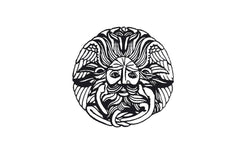
Led by Nicolas Potel in Beaune, Groupe Bellene is composed of the négociant arm Maison Roche de Bellene, the winery arm Domaine de Bellene, and a special back-vintage series under the Collection Bellenum label.
- Maison Roche de Bellene offers a complete range of wines, with an emphasis on individual terroirs from old vines of more than 40 years. All of the growers that Nicolas works with are either organic certified or sustainably farmed.
- Domaine de Bellene represents the wines that are produced and bottled from Nicolas Potel's private vineyard holdings.
- Collection Bellenum is a back vintage series that Nicolas Potel sourced from his friends in the region, offering a magnificent selection of bottled history. The wines have moved only twice in their lives, from the original cellar to Potel's and now to yours!
Nicolas Potel grew up at Volnay's Domaine Pousse d'Or, where his father worked. He trained abroad and returned home in 1996 to build a négociant business and started Maison Nicolas Potel, where he sourced grapes from good parcels, often working with the growers to improve the quality. By 2002, he was making 120 wines from 50 different appellations, and the rest is history!
Press Reviews
Wine Align
90 points - Megha Jandhyala, S.J.D
This is a solid entry-level Bourgogne pinot noir - supple and juicy, brimming with flavours of dark cherries and underbrush, alongside notes of toasted spice and a hint of cured meat. Tannins are ripe and rounded; acids provide just enough lift. The finish is long, ending on a pleasantly herbal note. Tasted March 2025.
90 points - Michael Godel
Nothing quite like a “normal” year to craft the most getable and crushable Bourgogne at the behest and passionate hands of Nicolas Potel. Old vines are in the 45 to 50 year range in highest of high density plantings harvested at a “normal” time in this post-modernist, climate adjusted period. That being the 5th to the 13th of September and fruit already ripe, burning the brix and phenol candle at both ends. Nose in to the promise of violets and roses, dive in for crunchy red fruit and some pretty solid tannins. That early yet necessary pick preserved acids with much to say in a pinot noir as tart and spirited as it is enriching of spirit. Despite the high drink-ability factor the structural parts creep up so wait a year for this to settle further. Drink 2022-2025. Tasted June 2021.
90 points - Sara d'Amato
Lovely, bright, crunchy and lively, this entry level Bourgogne from Roche de Bellene rarely disappoints. With a fine, elegant, and well-integrated oak treatment and an invitingly silky texture, this pinot noir is notably compelling and delivers solid value. Excellent length. Tasted June 2021.
- White Wine
- Chardonnay
- Dry
- Medium Bodied
- 750ml
About the Winery
Pearce Family Wines

In the early 2000's Nicholas Pearce was exposed to the garagiste movement in Bordeaux and was particularly inspired by négociants like Jean Luc Thunevin (Saint Emilion), James Sichel (Margaux) and Nicolas Potel (Beaune) from Burgundy.
After returning home to Ontario and starting his own wine company, he has had a hand in making 10+ wines in two hemispheres, 3 countries and 5 different appellations since the 2013 vintage.
Pearce Predhomme

Pearce Predhomme is a collaboration of like-minded individuals from around the globe. Founded with a mission to build and import wines from our favourite appellations while offering an unequaled value/quality ratio for the sommeliers & wine buyers in Ontario. This is a project between Toronto Sommelier and entrepreneur Will Predhomme and Ontario wine importer Nicholas Pearce. They have partnered with Radford Dale in South Africa and NorthWest Wine Co. in Oregon to create these special cuvées.
Press Reviews
Wine Align
89 points - David Lawrason
This [2021 vintage] is a fairly subtle Niagara chardonnay, both lively and rich at the same time. The fruit comes first here with apple/pear and lemon, then oak following in with gentle spice and toast. It is medium bodied, fairly rich yet lively with considerable warmth and acidity. The flavour focus and length are excellent.
- Red Wine
- Barbera, Dolcetto, Nebbiolo
- Biodynamic, Natural, Organic, Vegan-Friendly
- Dry
- Medium Bodied
- 750ml
- 13% alc./vol
About the Winery
Punset

While the vineyards that form Punset have been farmed by the Marcarino family for generations, it is truly thanks to Marina and her incredible energy that the estate is how it is nowadays. In the 1980s, she decided to pursue organic farming – a demanding choice that was rewarded by becoming the first estate to receive the organic certification in Italy. Her passion for the soil and the environment led her to embrace biodynamics and the agronomic philosophy of Manasobu Fukuoka. From one of the healthiest vineyards in Italy, Marina crafts wines that brim with life, energy, and pure terroir.
Known for the very first certified organic Barbaresco of Italy, Marina continues to show the world that you can preserve tradition and think of the future simultaneously.
Press Reviews
Wine Align
90 points (2018) - Michael Godel
Mainly dolcetto (70 per cent) with barbera and nebbiolo. Not much of the latter but necessary to widen the expression of the Langhe. Here it’s an explanation point, not a question, as in a confirmation of the exclamatory Piedmontese expression. Bright red amalgamated fruit with proper acidity and the ability to work alongside anyone and all. Drink 2019-2022. Tasted November 2019.
- Red Wine
- Cabernet Franc, Merlot
- Dry
- Medium Bodied
- 750ml
- 13.50% alc./vol
About the Winery
Château du Moulin Noir
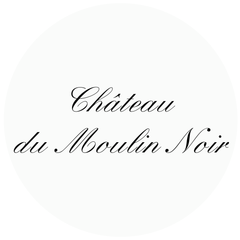
This beautiful right-bank Bordeaux estate consistently produces high-value, elegant and classic Merlot dominant wines and is considered one of the most famous Château of this appellation. Located in Montagne-Saint-Emilion, Château Moulin Noir consists of seven hectares of vineyards on clay and limestone soils.
This château owes its name to a family feuddating back to the Middle Ages. Two brothers were arguing about their father’s legacy with the youngest brother being incredibly jealous that everything went to the elder. He was so jealous that he burnt the château to the ground - Moulin Noir translates to “blackened Mill”.
- Red Wine
- Barbera
- Sustainable, Vegan-Friendly
- Dry
- Medium Bodied
- 750ml
- 14% alc./vol
About the Winery
Cascina Castlèt
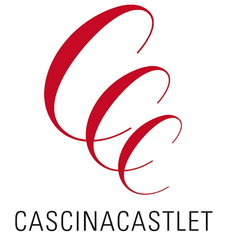 Cascina Castlèt has belonged to the Borio family for generations; Mariuccia, the current owner, inherited it from her father in 1970. Mariuccia focuses on her terroir and the local varieties. The vineyards of the estate are spread over 31 hectares, and are all located in Costigliole d'Asti.
Cascina Castlèt has belonged to the Borio family for generations; Mariuccia, the current owner, inherited it from her father in 1970. Mariuccia focuses on her terroir and the local varieties. The vineyards of the estate are spread over 31 hectares, and are all located in Costigliole d'Asti.
Press Reviews
James Suckling
91 points
Very nice blueberry and blackberry character with some spicy orange. Medium body. Fruity and tart. Drink now.
- White Wine
- Albarín
- Sustainable, Vegan-Friendly
- Dry
- Medium Bodied
- 750ml
- 13% alc./vol
About the Winery
Bodegas y Viñedos Pardevalles
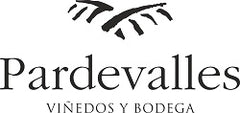 Pardevalles is recognized for being one of the driving forces behind the D.O Tierra de León, betting on the development of the indigenous grape varieties Prieto Picudo and Albarín Blanco. In 1949 Rafael Alonso founded Pardevalles continuing with the family tradition of growing grapes and making wine. The winemaking tradition in León goes back more than 400 years, famous for its centuries-old caves where wine was originally made.
Pardevalles is recognized for being one of the driving forces behind the D.O Tierra de León, betting on the development of the indigenous grape varieties Prieto Picudo and Albarín Blanco. In 1949 Rafael Alonso founded Pardevalles continuing with the family tradition of growing grapes and making wine. The winemaking tradition in León goes back more than 400 years, famous for its centuries-old caves where wine was originally made.The vineyards of Pardevalles are located between 750 and 820 metres above sea level, in an area with a Continental climate. They grow in poor, rocky alluvial soils which helps maintain the freshness in the wines. The philosophy of the Estate is grounded in making wines which express the character and identity of their origin, with a deep respect for the earth and the indigenous varieties of grape, combining tradition, innovation, and hard work.
Press Reviews
Decanter
92 points - World Wine Awards
WineAlign
90 points (2022) - Sara d'Amato
The early 2000s saw a revival in the albarín grape variety planted largely in the higher elevations of Castilla y León in southwestern Spain and a majority of that is being produced by Pardevalles. This refreshing and zesty expression offers an abundance of flavour from starfruit, lime, and yellow apple, to elderflower and toasty lees. Sure to be a hit with fans of sauvignon blanc and vermentino. An effortlessly elegant sipper with notable length. Tasted February 2024.
- Sparkling Wine
- Chardonnay, Macabeo, Pinot Noir, Xarel-lo
- Organic, Vegan-Friendly
- Medium Bodied
- 750ml
- 12% alc./vol
About the Winery
Mas Codina

The Mas Codina estate is located in the heart of the Alt Penedès region, comprising of low-lying plains and hills between 250 and 300 metres high.
Until recently, the farm has always grown, and made a livelihood from, cereals, grapes, peaches and vegetables, as well as farm animals. Now, apart from century-old olive trees, all the land is devoted to vineyards.
Mas Codina has been in the same family for generations. They have adopted organic farming practices promoting natural processes and seeking a balanced ecosystem. All because of their love for land and tradition. There are currently 40 hectares of vineyards that are being organically farmed.
Press Reviews
Wine Align
91 points - David Lawrason
This is a quite fine, firm and elegant cava with nicely placed yellow fruit, mineral and some wet stone and light bready character. This has good character. Nicely firm and dry with a nutty, slightly bitter finish. The length is excellent. Tasted March 2022.
Value Rating: 5/5 Stars
91 points - John Szabo, MS
Attractive aromatics and balance on the palate are features here on this well-made and flavourful cava, in the brut nature style (no added sugar), though neither hard nor overly tart. I like the toasty, creamy citrus fruit - lees ageing flavours are in stark relief, mixing with a good degree and range of other flavours, from fruit to nuts and beyond. Very good length, too. An impressive example in the category, and better than the last bottling tasted in March of 2022. Tasted November 2025. Previous: Here's a ripe and creamy, but also crisp and bone dry Cava with fine flavour definition and concentration, and decent length. Ripe citrus, orange and lemon zest, and gentle sweet herbal notes lead on the palate. Ready to drink. Tasted March 2022.
90 points - Michael Godel
Singular Cava work from a 40 hectare estate in the Alt Penedès dating to 1681. Organic, estate bottled and vines 20-30 years of age. A blend of chardonnay, macabeo, pinot noir and xarel-lo, aged on its lees for a minimum of two years before release. Buttered golden toast brioche, baked apples and light caramel. Delicious. Drink 2025-2027. Last tasted November 2025.
- Red Wine
- Sangiovese
- Organic, Vegan-Friendly
- Dry
- Medium Bodied
- 750ml
- 14% alc./vol
About the Winery
Villa Calcinaia
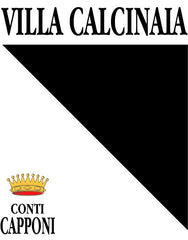
Villa Calcinaia is situated in the centre of Chianti Classico near the town of Greve-in-Chianti. This historic estate has been home to the Counts Capponi since 1524, and is maintained by Sebastiano Capponi and his brother Niccolo. In 1992, Count Sebastiano Capponi became the first in the history of the family to manage the winery personally, giving a new life to the vineyards and the cellar.
The family owns 200 hectares of land planted with olive trees, vines and pine trees. Organic farming is the standard at Villa Calcinaia where 75 acres of vineyard are planted with Sangiovese, Merlot, Canaiolo, Grechetto, Vernaccia, Trebbiano, and Malvasia. Through every vintage, the wines are crafted with food in mind. They are balanced, elegant, perfumed, and savoury yet refreshing with restrained vigour and intensity that ensures longevity.
Press Reviews
WineAlign
91 points - Sara d'Amato
A firm Chianti Classico, brightened by the purity of red fruit, simultaneously vibrant and structured. Gentle notes of tilled earth and new leather complement the cherry-driven palate, lifted by lively freshness. Fine-grained yet firm tannins frame the wine’s emerging youthful complexity. Stylish and promising, it will reward patience with further time in bottle.
Tasted January 2026.
90 points - John Szabo, MS
2023 is a fine vintage for Calcinaia's entry point "Cappone" bottling of Chianti Classico (owned by the current conte, or count, Cappone), ripe and generous but also clearly delineated and precise, with textbook savoury cherry flavours, red and black, and comfortably ripe tannins and acids. There's a pleasant ease and accessibility on the palate, an inviting profile that will be best enjoyed over the next 2-3 years. Textbook; certified organic as a bonus. Tasted January 2026.
- White Wine
- Chardonnay
- Sustainable, Vegan-Friendly
- Dry
- Medium Bodied
- 750ml
- 12.5% alc./vol
About the Winery
Domaine de Mauperthuis

A family estate created by Marie-Noëlle & Laurent Ternynck, Domaine de Mauperthuis is located in Prehy, near the town of Chablis. Their wines express the terroir of this amazing region and the vineyards are currently undergoing the transition to organic. Domaine de Mauperthuis covers around twenty hectares of vineyards around Chablis. The estate, in the Burgundy appellation, is planted in Chardonnay, Pinot Noir, Sauvignon and César, on land facing south, benefiting from exceptional sunshine.
Press Reviews
Wine Align
91 points (2020) - David Lawrason
This is a quite rich, slightly oxidative style of unoaked chardonnay with pale golden colour and a ripe nose of baked apple. Peach pie, toasty lees and vague nuttiness. It is medium weight, smooth and almost creamy with fine acidity and mineral underpinning. The length is excellent. Tasted June 2022
- Sparkling Wine
- Chardonnay, Pinot Noir
- Sustainable, Vegan-Friendly
- Medium Bodied
- 750ml
- 12% alc./vol
About the Winery
Champagne Fresne Ducret
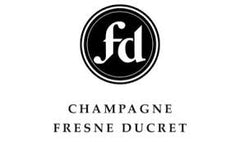
Fresne-Ducret is rich in family history and has been rooted in the premier cru village of Villedommange since the mid 1800s. Originally growing grapes for the big champagne houses, it wasn’t until the end of the second world war that the family decided to make their own wine. The tradition carries on today with Pierre Fresne and his wife Daniella (an Oakville ex-pat). Their philosophy is to produce wines that best exemplify the terroir of Villedommange, and they do this with sustainability in mind.
In 2014, Pierre Fresne embarked on a new adventure by creating a limited series of champagnes based on his desire for experimentation. Since then, he has produced one or two of these wines each year. Each are unique, according to his wishes and the profile of the vintage. This unique collection is called Arquémie, the term for alchemy in the Middle Ages. In 2018 Pierre began converting the vineyards to organic viticulture, and 2021 will be their first organic certified vintage.
Press Reviews
Wine Align
96 points - David Lawrason
This has a very intriguing, generous nose of macaroon (coconut), straw, dried apple, toast and almond/hazelnut. Also a lovely sense of sweet nut fudge. It is medium bodied with fulsome flavour, riveting acidity and all kinds of Champagne minerality. Great focus and length here. Wow! Tasted October 2020
93 points - John Szabo
Fresne Ducret's latest release of this premier cru "Chemin du Chemin champagne is a characteristically smoky and savoury, toasty and biscuity, mature champagne in the English style, balanced and savoury. I really like the developed, mature profile here, the great length. This is very good champagne ready to go. Tasted October 2020.
93 points - Michael Godel
When richness, yeasty and warm toasted brioche get together in Champagne the effect is comforting and potentially hypnotizing. From the Premier Cru village of Villedommange dating back to the mid 1800s, the pedigree is noted and the 48 months of lees aging a coup for creating both a creamy and a revitalizing Champagne. There is an oxidative aspect here and it's effectualness is one that imagines exotic spice cupboards, masala mixes and gingery tisanes. Quite the exotic bubble, lightly frothy, elegantly styled, complex and fine. Drink 2020-2026. Tasted October 2020.
Wine Enthusiast
94 points
This Champagne shows some fine maturity. A blend based on the 2014 vintage, it now has toastiness while keeping intense freshness. Acidity and touches of minerality come through the spiciness. Drink now.
- Red Wine
- Cabernet Franc, Cabernet Sauvignon, Merlot
- Dry
- Medium Bodied
- 750ml
Press Reviews
Wine Align
90 points (2016) - David Lawrason
The 2016 vintage has put some punch into this inexpensive merlot-based Bordeaux. There is a sense of volume and energy. The nose is quite lifted with blackberry/raspberry fruit, notable herbal presence, some meatiness and spice. It is medium-full bodied, with warm alcohol, juicy acidity and some slightly green tannin. The length is excellent. Best 2025 to 2030
89 points (2016) - Michael Godel
Blends merlot, cabernet sauvignon and cabernet franc for a Right bank bruiser, especially at the cost. The wood is still very much in charge and if the 2014 showing at this stage is any indication then 2016 will need even more time to unwind. In this stage the merlot is in full command, verdant, savoury, herbal and with toasty oak flavours yet settled. Wait on this one. Drink 2022-2026. Tasted November 2021.
- Red Wine
- Malbec
- Vegan-Friendly
- Dry
- Medium Bodied
- 750ml
- 14.5% alc./vol
About the Winery
Bodega Marco Zunino
 The dream of 4 French partners in Argentina's Mendoza region can be found 200 kilometers from the district capital, in the South of the region, in the town of San Rafael. It's an oasis surrounded by large canyons and crossed by two rivers, Diamante and Atuel, vital for agriculture and tourism in the region.
The dream of 4 French partners in Argentina's Mendoza region can be found 200 kilometers from the district capital, in the South of the region, in the town of San Rafael. It's an oasis surrounded by large canyons and crossed by two rivers, Diamante and Atuel, vital for agriculture and tourism in the region.The arid climate, rugged landscape coupled with the plane trees located along the country roads and weeping willows bordering its rivers that makes the area reminiscent of the midi region in the South of France.
The thirty-hectare vineyard boasts an exceptional site and an idyllic regional climate for wine producing. The low rainfall, vineyard altitude (670m) and high temperature variations are key to the diversity and quality of San Rafael’s terroir and offers the ideal setting for a truly exceptional quality of grape.
Press Reviews
WineAlign
90 points - David Lawrason
This is a quite bright and juicy young malbec. The nose has some energy with lifted mulberry/raspberry, fresh herbs, red rose and some shrubby character. It is medium-full bodied, with good acidity, some heat and slightly astringent tannin. Lacks elegance perhaps, but has some life. Very good length. Tasted January 2026. Tasted January 2026
90 points - Megha Jandhyala, S.J.D., DipWSET.
This is quite a classic representation of malbec, with notes of nutmeg, cloves, and dried leaves serving as top notes, followed by flavours of damson plums and blueberries. The palate is medium to full bodied and approachable, with fine-grained tannins and succulent acidity. The long finish displays accents of vanilla and dried henna, then diffused warmth. Balanced, with very good concentration and length, this is wine that should appeal to most. Tasted January 2026.
- Red Wine
- Nero d'Avola
- Natural, Organic, Vegan-Friendly
- Dry
- Medium Bodied
- 750ml
- 13.00% alc./vol
About the Winery
Cantine Barbera
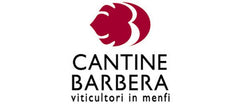
Cantina Barbera is located in the Menfi Coast, on the west coast of Sicily. The vineyards are about one mile from the Mediterranean Sea: an uncontaminated deep blue sea, facing South, where low cliffs and sandy dunes create a beautiful environment protected by the Belice River Natural Reservation Fund.
A third generation farmer, Marilena Barbera farms the Inzolia that her grandfather planted in the 20's, just as she attends to the native varietals that are the new frontier of her own generation: Perricone, Nerello, Alicante, Nero d'Avola and Grillo. Marilena makes her wines praticticing organic farming and natural winemaking, while paying utmost respect to Menfi's terroir.
"At the winery, I chose to work only with spontaneous fermentations and to adopt non invasive winemaking practices, in order to respect the unique personality of Sicilian native grape varieties and the beautiful land to which they belong."
- Rosé Wine
- Prieto Picudo
- Sustainable, Vegan-Friendly
- Dry
- Medium Bodied
- 750ml
- 13.5% alc./vol
About the Winery
Bodegas y Viñedos Pardevalles
 Pardevalles is recognized for being one of the driving forces behind the D.O Tierra de León, betting on the development of the indigenous grape varieties Prieto Picudo and Albarín Blanco. In 1949 Rafael Alonso founded Pardevalles continuing with the family tradition of growing grapes and making wine. The winemaking tradition in León goes back more than 400 years, famous for its centuries-old caves where wine was originally made.
Pardevalles is recognized for being one of the driving forces behind the D.O Tierra de León, betting on the development of the indigenous grape varieties Prieto Picudo and Albarín Blanco. In 1949 Rafael Alonso founded Pardevalles continuing with the family tradition of growing grapes and making wine. The winemaking tradition in León goes back more than 400 years, famous for its centuries-old caves where wine was originally made.The vineyards of Pardevalles are located between 750 and 820 metres above sea level, in an area with a Continental climate. They grow in poor, rocky alluvial soils which helps maintain the freshness in the wines. The philosophy of the Estate is grounded in making wines which express the character and identity of their origin, with a deep respect for the earth and the indigenous varieties of grape, combining tradition, innovation, and hard work.
Press Reviews
WineAlign
90 points (2022) - Sara d'Amato
Pours a luminous, deep pink, this rosada from Leon is made entirely of the indigenous prieto picudo grape, more typically a blending variety with dark skins and often resulting in wines with licorice-tinged black and red fruit. With youthful exuberance and potency, this salty and succulent expression features a wealth of lightly candied red berries, slippery tannins and a touch of welcome bitterness that contributes balance and a sensation of freshness. Best to enjoy in its youthful condition but it has the concentration for another year or two of aging. Tasted February 2024.
- Red Wine
- Cabernet Franc
- Organic, Vegan-Friendly
- Dry
- Medium Bodied
- 750ml
- 13.50% alc./vol
About the Winery
Château de Parnay

Château de Parnay is the flagship of the AOC Saumur Champigny. The property is located along the Loire river, classified as UNESCO World Heritage, on the most reputable clay and limestone terroirs of the appellation. The historic property was taken over by Mathias Levron & Régis Vincenot in 2006 with the aim of restoring the nobility of this special place.
Drawing their strength from the authenticity of their values, they now cultivate 50 hectares of vines with the aim of producing exceptional wines in a way that respects the environment. They have been certified organic since 2013 and are about to be certified biodynamic too.
The Clos of Chemin des Murs is the jewel of the property! Coming from the imagination of it's orginal owner, Antoine Cristal, this Clos was built, planted and cultivated according to an unprecedented technique. On this half hectare of Chenin Blanc, each vine was planted on the north face of a stone wall. Through a hole in the stone the vine crosses through the wall and allowing the grapes to grow facing the southern sunshine. The vine is said to have its 'foot in the cool and belly in the sun'.
Press Reviews
Wine Align
93 points - Megha Jandhyala
This is a concentrated, complex, gracefully balanced cabernet franc. Notes of ripe red plums, blackberries, dark cherries, tobacco, dried leaves, and violets are interwoven here to form an elegant, engaging, and varietally representative flavour profile. The palate is densely flavoured but lithe, with fine-grained tannins and refreshing acids. The finish is long, layered, and captivating. Though it can be enjoyed now, I would cellar this for 2-3 years. Tasted January 2024.
93 points - David Lawrason
This is a serious cab franc indeed - not so much in terms of weight and power, but in its complexity, poise and length. It’s a deeply coloured for franc. The nose shows fine, ripe raspberry, perfectly pitched by fresh herbs, tobacco and violet. It is loosely structured mid-palate, and a touch warm, with slightly green tannin. The length is excellent. I would age it a year or three. Tasted January 2024
92 points - John Szabo, MS
Silky and refined, elegant but dense, this Saumur Champigny (cabernet franc) is a substantial and serious wine, with a high degree of textbook regional character, complete with a touch of green-herbal, varietal flavour. Tannins are fine and dusty, acids gently salty, and length good to very good. I'd suggest another year or two in the cellar to further refine the texture and develop complexity - potential I think is high. Tasted January 2024.
- País
- Sustainable
- Dry
- Medium Bodied
- 750ml
- 13% alc./vol
About the Winery
Garage Wine Co.

Garage Wine was literally started in a garage in 2001, by Etobicoke expat Derek Mossman and his wife Pilar Miranda. Since then, the dynamic duo handcraft wines from a series of individual vineyards located in the Maule and Itata Valleys, in the south of Santiago, Chile.
Garage Wine Co makes wines from a series of individual parcels, small lots / bottlings of 8-22 barrels that include a series of dry-farmed field-blends of Carignan, Garnacha, Monastrell, País, Cinsault and Cab Franc grown on pre-phylloxera rootstock with small farmers in the Maule and Itata. Each wine is from a 1-2 hectare parcel in a different place.
Over the years working in the community they have raised a veritable posse of vineyard hands whose skills are working the vineyards the old way / the traditional way– originario. The vineyards are on the old coastal range of mountains closer to the Pacific and have granitic soils with cracks for roots to get deep down into.
When GWCo. speaks of the provenance of these wines they mean more than just the geological terroir. Derek and Pilar think the farming practices that have evolved over generations have as much to do with the wines’ personalities as the soils. All the wines are made by hand with native yeasts in small tanks, punched down manually and pressed out in a small basket press. GWCo is still very much a DIY operation and we still tow much of the crop back to the winery in trailers behind trusty pickup trucks 2,000 kilos at a time.
Press Reviews
WineAlign
90 points - David Lawrason
Pais is one of the oldest commercial grapes of Chile, long used for bulk wine, but now enjoying an renaissance as a light, fresh fruited red. This is quite delicious with pomegranate seed, cherry, a light leafiness and pink rose. It is light bodied (12.5%) with a certain crispness and freshness. Almost tart but it is balanced. The length is very good to excellent. Chill a bit. Tasted January 2026
90 points - Michael Godel
The idea might be a little salty but país by Garage Wine is always a top hit in the making and more than just an interlude set between more serious wines, and songs. Salty yes and while some won’t get the vibe, consider what this varietal mission is all about, to revive old vines and make wines from some of the world’s older plant DNA. Now imagine a red wine of unique tang and wild backwoods fruit as if it were music with a back beat, no melodies or rap overtop, from a sound that could be both Regina Spektor or Eminem. Now you get the idea for país and a must try wine from Chile’s Maule Valley Secano Interior Caquenes. Drink 2026-2028. Tasted January 2026.
- White Wine
- Garnacha Blanca
- Natural, Sustainable, Vegan-Friendly
- Dry
- Medium Bodied
- 750ml
- 14.2% alc./vol
About the Winery
Bodegas Puiggròs
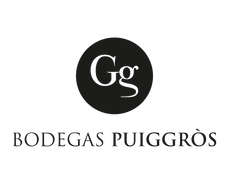
Since 1843, the Puiggros family has been producing wines from their own vines in the Odena region of Catalunya for the family and close friends. Over generations they had come to realize that their vineyards and techniques were something worth sharing with the world. A sincere dedication to the terroir in their zone and the indigenous varieties that grow there, allows them to constantly discover ways to unlock all of the magic that lies within their land.
Starting with conscious and clean farming in the vineyard, they hand-harvest only the best fruit for their production, and ferment each vineyard separately in varying vessels to accentuate what the vines have to show; some in stainless steel, and many in clay amphora of differing sizes. All the while seeing very little sulfur use (if any) until bottling. Puiggros is pushing the quality of northeastern Spain's wines forward, and doing so in a clean and unique way.
Press Reviews
Wine Align
91 points - Michael Godel
Of Catalonian garnatxa blanca planted upwards of 600m on limestone and clay before aging judiciously inside 800L clay amphora. A going concern of method and style for white grenache in this northerly part of Spain and 2023 comes away as clean and fleshy as any previous vintages. Sapid with an herbal-botanical element while fruit is so bloody persistent in its ability to shine. These are the right kinds of tonics and bitters to fulfill a garnacha raised in amphora dream. Drink 2025-2028. Tasted November 2025.
90 points - Sara d'Amato
High-elevation white garnacha raised in amphora, delivering a juicy and engaging profile in eye-catching packaging. Clean, bright, and subtly salty with flavours of peach, lemon zest, chamomile and dried herbs. It's nervy and deceptively complex, finishing with a gentle swell of warmth from otherwise unassuming alcohol. Excellent length. Drink now or hold 2-3 years. Tasted November 2025.
- Red Wine
- Graciano, Grenache, Tempranillo
- Sustainable
- Dry
- Medium Bodied
- 750ml
- 14.5% alc./vol
About the Winery
Bodegas Exopto
Exopto is Latin for “to long for” or “to desire greatly” and it is the dream of Frenchman Tom Puyaubert and his family to endeavor to craft and assemble wines where the whole adds up to more than the sum of their parts. Tom relocated from France to Rioja in 2000 after falling in love with the region and working for the French cooperage Saury as its Spain representative.
When Tom began Exopto, he wanted to do a project that produced wines within this historical context of Rioja - combining both worlds in a unique way. His idea is to remain true to the blending of the principle grape varieties and to do so from the best terroirs/villages for those varieties crossing sub-regions of Rioja. Each wine though, has a majority of a different principle grape – showcasing that variety specifically within the context of a blend. The viticulture and winemaking model is that of the “vigneron” days – small plots of vines in the extremes, wild yeast fermentation in concrete or old oak vats and then aging in a way to showcase the fruit, minerality and terroir not the wood or aged flavours that people often associate with Rioja.
Press Reviews
Wine Align
91 points (2021) - John Szabo
A blend of garnacha, tempranillo and graciano grown at around 500m in the Sierra de Cantabria, this is aged exclusively in concrete and thus a long way from what many would consider the 'traditional' style of Rioja. I like the freshness and vibrancy allied at the same time to ripe, plush fruit spanning both the red and black spectrum. Tannins are supple and acids balanced and creamy, leading into a long, gently saline finish. Concentration and depth, as well as complexity overall, far exceed expectations in the category. Well made wine from an evidently superior vineyard, delicious now, or hold 3-4 years. Tasted January 2024.
91 points (2021) - Megha Jandhyala
This is a charming Rioja, a blend of garnacha, tempranillo, and a small amount of graciano. I like the bright, supple red fruit here and the pretty floral and savoury herbal notes. The palate is lively and supple, with fine-grained tannins and juicy acids. Fresh, streamlined, and with a sense of lightness that is appealing, this wine is ready to drink, though it can also be cellared for a couple of years. Tasted January 2024.
- Red Wine
- Listán Negro
- Sustainable, Vegan-Friendly, Volcanic
- Dry
- Medium Bodied
- 750ml
- 13.5% alc./vol
About the Winery
Viñátigo

Juan Jesús is a proud native of Tenerife and the fourth generation of growers. During the thirty years that he's overseen Bodegas Viñátigo, he has considerably increased its holdings, planting varieties that he and his team recuperated from near extinction.
Driven by passion and love for his homeland, Juan decided to revive and work to save the native grape varieties that were brought to the Canary Islands by the conquers back in the 15th century and that had survived on the islands for centuries. He is a hero of contemporary Canarian viticulture. The wealth of knowledge that his work has created has helped underpin the significant expansion of wine styles that are now available throughout the archipelago, and his wines have achieved a calibre of class that many doubted the Canaries would ever produce again. (The Epic Wines of the Canary Islands, written by Santo Bains).
Press Reviews
Wine Align
91 points - Michael Godel
Freshest of freshest varietal listán negro which means the hyperbole of acidity distracts from detecting any serious tannin while fruit and volcanic hypotheticals create their necessary union. The unmistakable and impalpable listán negro is expressed through a house’s consistent, persistent and unwavering purity, without grift or deception. If "your sensibilities are shaken by the slightest defect" please do not worry and don't call the police because "slight" is the operative word. This is the Viñátigo way and this their accessible red wine in celebration of clarity from a place. Getting at this 2024 involves no early indication of potential danger or failure but instead the prospect of delicious drinking for these next few years. No canary in a coal mine indeed but yet a character that is expressly Santa Cruz de Tenerife. Oh joy, oh rapture for a crispy varietal red seemingly always “acertado,” readied, on call and on point. Drink 2026-2029. Tasted June 2025.
91 points - Sara d'Amato
Expressive and grippy with an expansive aromatic profile. This volcanic red from the sub-tropical Atlantic outpost of Tenerife, is made from the local listán negro is juicy and naturally spicy with the faintest hint of volatility adding character to the wine. Tannins are lightly grippy with snappy acids on the palate. Engaging and versatile with food. Ready to drink but don't serve too warm. Tasted June 2025.
90 points - Megha Jandhyala, S.J.D., DipWSET.
This is an intriguing and distinctive listán negro, with aromas of ripe red berries, cherries, and pomegranates amplified by a whiff of volatile acidity. These fruit flavours are accompanied by pleasing flavours of dried savoury herbs, including juniper and rosemary, crushed wildflowers, and a hint of spice. The palate is medium bodied, with fine, drying tannins and crisp acidity, while the finish is long and fragrant, with notes of sweet herbs peaking on the long, layered finish. I would enjoy this wine sooner rather than later, ideally over the next year. Tasted June 2025.
- Red Wine
- Sangiovese
- Organic, Vegan-Friendly
- Dry
- Medium Bodied
- 750ml
- 13% alc./vol
About the Winery
Villa Calcinaia

Villa Calcinaia is situated in the centre of Chianti Classico near the town of Greve-in-Chianti. This historic estate has been home to the Counts Capponi since 1524, and is maintained by Sebastiano Capponi and his brother Niccolo. In 1992, Count Sebastiano Capponi became the first in the history of the family to manage the winery personally, giving a new life to the vineyards and the cellar.
The family owns 200 hectares of land planted with olive trees, vines and pine trees. Organic farming is the standard at Villa Calcinaia where 75 acres of vineyard are planted with Sangiovese, Merlot, Canaiolo, Grechetto, Vernaccia, Trebbiano, and Malvasia. Through every vintage, the wines are crafted with food in mind. They are balanced, elegant, perfumed, and savoury yet refreshing with restrained vigour and intensity that ensures longevity.
Press Reviews
Wine Align
91 points - Michael Godel
Loamy with Alberese grip and warmth from a season of unavoidable truth to gift darker fruit. Namely sangiovese with 10 percent canaiolo to level out the balance between pH and acidity for harmony and elasticity. Feels like success out of a challenge presented. Last tasted October 2025.
The current vintage for the winery and cellar built circa 1763 by Ferdinand Capponi is undeniably aromatic in the ways of this estate’s consistent Chianti Classico Annata from the west bank above the Greve River. A mix of humid concrete, herbal brush, Amaro and nut toasty warmth. Shakes of silty salt and white pepper for a seasoned Annata grown, raised and bottled for all the good reasons. Drink 2026-2029. Tasted September 2025.
- White Wine
- Medium Bodied
- 750ml
About the Winery
Domaine Frédéric Brouca

Frédéric grew up in Normandy and met his Canadian wife Elaine at university in Lille, Northern France. They live a nomadic lifestyle (Canada, India, Singapore and USA) though Frédéric spends about half of his time in Faugères. Since early age, Frédéric had a calling for farming and the fierce desire to become a winegrower. After completing a Masters Degree in Finance in 2001, Frédéric went back to college for a Sommelier diploma and started his career as a Burgundy wine broker.
In late 2012, Frédéric and Elaine were fortunate to take over 25 acres of old vines in Faugères, organically farmed for twenty years and deeply rooted in schist soils.
2013 was the inaugural vintage for Domaine Frédéric Brouca. In his modest winery in the village of Laurens, Frédéric is creating a new vision for Faugères wines; fresh, vibrant and made without artifice. Nothing revolutionary, simply returning to our grandparent's ideology of farming and winemaking to craft 'Vins Vivants'. The Faugères Appellation is in the heart of Languedoc in the Hérault department. Here, winemaking dates back to the Greek times and was developed during the Roman Era. It wasn't until the early 1900's, however, that the wines became more widely known for its unique schist soils and moderate Mediterranean climate. These villages are heavily reliant on wine as an important part of their culture and economy.
The area is stunning with mountain views and close proximity to the Mediterranean Sea (20 miles / 30 kms). Faugères has a long history of responsible farming. It boasts the highest percentage of organic vineyards for any AOC in all of France with almost 50% of farmers making the choice.
Press Reviews
Wine Align
92 points - John Szabo, MS
A vermentino (rolle), roussanne, grenache blanc blend from Frederic Brouca's Languedoc operation with a decidedly natural leaning, this is nonetheless a very stable and clean, sapid and saline wine with terrific succulence and plenty of white fleshed orchard fruit, apple and pear, white flowers and sweet herbs. There's plenty of complexity and pleasure on offer, and length and depth are excellent in the category. Lovely stuff that will satisfy the natty crowd, but also those who put top quality above philosophy, a winning formula. Drink or hold 2-4 years - seems to be moving slowly. Tasted January 2026.
92 points - Michael Godel
The Hérault work of Normandy-born Frédéric Brouca brings elements of natural winemaking, experimentation and fantasy, especially to his whimsical bends, as here with grenache blanc, roussanne and vermentino. The IGP of Hérault in the Languedoc-Roussillon on the southern coast of France is the source and Brouca brings forth his cleanest white of utmost purity and clarity for 2024. Fresh is the understatement and overworked the over because this just feels like grapes layered for all the right reasons and without any obfuscation. Energetically charged, dry with notes of lemon and honeycomb, a honeysuckle floral addition and all that matters for what truly works. Drink 2026-2029. Tasted January 2026.
92 points - David Lawrason
This is an organically grown, Mediterranean blend of vermentino, roussanne, and grenache blanc grapes grown on schist soils in the south of France. It was fermented in a mix of concrete, stainless steel, and neutral oak barrels. It shows a soft, complex nose of peach, banana, yellow flower and wet stone with some bready/leesy character. It is medium-full bodied, nicely rounded but not too soft or sweet. Nice dry grip and warmth on the finish. The length is excellent and there is a sense of completion. Tasted January 2026
92 points - Megha Jandhyala, S.J.D., DipWSET.
Frédéric Brouca reportedly takes a low-intervention approach to viticulture and winemaking. This blend of vermentino, roussanne, and grenache blanc was fermented in mixed media including concrete, stainless steel, and neutral oak barrels. There is complexity and nuance on display here, including favours orchard, stone, and citrus fruit. The palate is supple and sprightly, in a pleasing way - the sensation of fullness lifted by lively acidity and a hint of bitterness. This sense of freshness continues on the finish. Tasted January 2026.




























